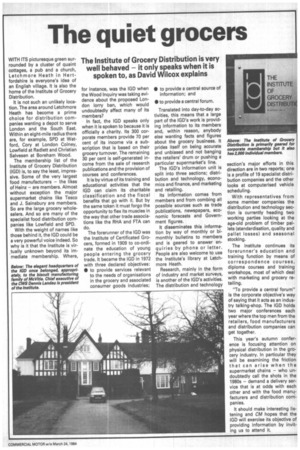The quiet grocers
Page 39

If you've noticed an error in this article please click here to report it so we can fix it.
WITH ITS picturesque green surrounded by a cluster of quaint cottages, a pub and a church, Letchmore Heath in Hertfordshire is everyone's idea of an English village. It is also the home of the Institute of Grocery Distribution.
It is not such an unlikely location. The area around Letchmore Heath has become a prime choice for distribution companies wanting a depot to serve London and the South East. Within an eight-mile radius there are, for example, SPD at Watford, Cory at London Colney, Lowfield at Radlett and Christian Salvesen at Boreham Wood.
The membership list of the Institute of Grocery Distribution (IGD) is, to say the least, impressive. Some of the very largest food manufacturers — the likes of Heinz — are members. Almost without exception the major supermarket chains like Tesco and J. Sainsbury are members. So are the large grocery wholesalers. And so are many of the specialist food distribution companies like Lowfield and SPD.
With the weight of names like those behind it, the IGD could be a very powerful voice indeed. So why is it that the Institute is virtually unknown beyond its immediate membership. Where, for instance, was the IGD when the Wood Inquiry was taking evidence about the proposed London lorry ban, which would undoubtedly affect many of its members?
In fact, the IGD speaks only when it is spoken to because it is officially a charity. Its 300 corporate members provide 70 per cent of its income via a subscription that is based on their grocery turnover. The remaining 30 per cent is self-generated income from the sale of research publications and the provision of courses and conferences.
It is by virtue of its training and educational activities that the IGD can claim its charitable classification and the fiscal benefits that go with it. But by the same token it must forgo the opportunity to flex its muscles in the way that other trade associations like the RHA and FTA can do.
The forerunner of the IGD was the Institute of Certificated Grocers, formed in 1909 to co-ordinate the education of young people entering the grocery trade. It became the IGD in 1972 with three declared objectives: • to provide services relevant to the needs of organisations in the grocery and associated consumer goods industries; • to provide a central source of information; and • to provide a central forum.
Translated into day-to-day activities, this means that a large part of the IGD's work is providing information to its members and, within reason, anybody else wanting facts and figures about the grocery business. It prides itself on being accurate and unbiased and not banging the retailers' drum or pushing a particular supermarket's line.
The IGD's information unit is split into three sections; distribution and technology, economics and finance, and marketing and retailing.
Its information comes from members and from combing all possible sources such as trade publications, newspapers, economic forecasts and Government figures.
It disseminates this information by way of monthly or bimonthly bulletins to members and is geared to answer enquiries by phone or letter. People are also welcome to use the Institute's library at Latchmore Heath.
Research, mainly in the form of industry and market surveys, is another of the IGD's activities. The distribution and technology section's major efforts in this direction are in two reports; one is a profile of 19 specialist distribution companies and the other looks at computerised vehicle scheduling.
With representatives from some member companies the distribution and technology section is currently heading two working parties looking at the age-old problem of timber pallets (standardisation, quality and pallet losses) and seasonal stocking.
The Institute continues its forerunner's education and training function by means of correspondence courses, diploma courses and training workshops, most of which deal with marketing and grocery retailing.
"To provide a central forum" is the corporate objective's way of saying that it acts as an industry talking-shop. The IGD holds two major conferences each year where the top men from the retailers, food manufacturers and distribution companies can get together.
This year's autumn conference is focusing attention on physical distribution in the grocery industry. In particular they will be examining the friction that can arise when the supermarket chains — who undoubtedly call the shots in the 1980s — demand a delivery service that is at odds with each other and with the food manufacturers and distribution companies.
It should make interesting listening and CM hopes that the IGD will exercise its objective of providing information by inviting us to attend it.
























































































